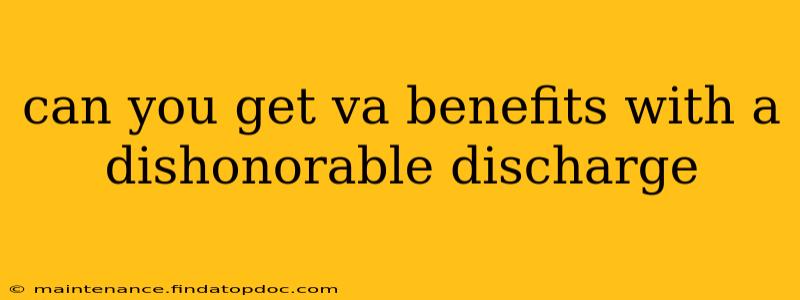Can You Get VA Benefits With a Dishonorable Discharge?
The short answer is generally no. A dishonorable discharge is the most severe form of military discharge, indicating a serious breach of military law or conduct. This significantly impacts eligibility for Veterans Affairs (VA) benefits. Unlike other discharges, a dishonorable discharge is not considered an honorable service, and therefore, it severely restricts access to most VA services.
This article will delve deeper into the complexities of VA benefits and dishonorable discharges, addressing common questions and clarifying the situation for veterans facing this difficult circumstance.
What constitutes a dishonorable discharge?
A dishonorable discharge is a result of a court-martial conviction for serious crimes like murder, rape, or desertion. It’s a formal finding that the service member’s conduct was so egregious it reflects poorly on the military. This differs significantly from other discharges like "Other Than Honorable" (OTH) which, while impacting benefits, doesn't carry the same level of severity.
What VA benefits are typically unavailable with a dishonorable discharge?
Veterans with dishonorable discharges generally cannot access the core benefits offered by the VA, including:
- Healthcare: Access to VA healthcare is usually denied.
- Disability Compensation: Payments for service-connected disabilities are unavailable.
- Education Benefits (GI Bill): The educational opportunities provided under the GI Bill are typically unavailable.
- Home Loan Guarantees: VA-backed home loans are generally inaccessible.
- Burial Benefits: VA burial benefits may not be available.
Are there any exceptions to this rule?
While exceedingly rare, there might be limited exceptions depending on specific circumstances and potential legal challenges to the dishonorable discharge itself. These situations typically involve complex legal processes and are not guaranteed. If you believe you might fall under an exception, seeking legal counsel specializing in veteran's affairs is crucial. You should not assume this is an option without professional guidance.
What about other types of discharges? (Other Than Honorable, Bad Conduct)
Other less severe discharges, such as "Other Than Honorable" (OTH) and "Bad Conduct," can still affect eligibility for VA benefits, but not to the same extent as a dishonorable discharge. Eligibility often depends on the specific reason for the discharge and the nature of the benefits sought. It’s vital to consult the VA directly or a veteran’s service organization for specific guidance concerning OTH or Bad Conduct discharges.
How can I learn more about my specific situation?
The best resource is the U.S. Department of Veterans Affairs (VA) itself. Their website provides detailed information on eligibility requirements for different benefits. Moreover, reaching out to a local VA office or a veteran’s service organization can provide personalized assistance navigating the complex system. These organizations can often offer legal advice and support in understanding your rights and options.
What if my discharge was upgraded?
If your dishonorable discharge was later upgraded to a more favorable discharge, you may then become eligible for some VA benefits. This upgrade requires a formal process and evidence to support the change. Again, seeking legal help is strongly recommended.
It’s imperative to understand that the implications of a dishonorable discharge are significant and far-reaching. If you're facing this situation, seeking expert legal and veteran's service advice is essential to navigating your options and understanding your rights. This article provides general information and should not be considered legal advice. Always consult with a professional for personalized guidance.
